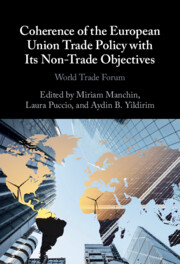Book contents
- Coherence of the European Union Trade Policy with Its Non-Trade Objectives
- Coherence of the European Union Trade Policy with Its Non-Trade Objectives
- Copyright page
- Contents
- Contributors
- Introduction
- 1 European Union Trade Policy and Non-Trade Issues
- 2 The European Union
- 3 Export Credit Agencies
- 4 The Effects of Non-Trade Provisions in Trade Agreements on Bilateral FDI
- 5 How EU Trade and Cooperation Policies Stimulated China to Go Green
- 6 The Role of Domestic Factors in the EU’s Governance of Labour Standards through Trade
- 7 EU Trade Agreements and Non-Trade Policy Objectives
- 8 Trade, the G20 and the EU
- 9 Enhancement of the European Parliament’s Monitoring for Better Coherence between Trade Policy and NTPOs
- Conclusion
- Index
- References
5 - How EU Trade and Cooperation Policies Stimulated China to Go Green
Published online by Cambridge University Press: 19 October 2023
- Coherence of the European Union Trade Policy with Its Non-Trade Objectives
- Coherence of the European Union Trade Policy with Its Non-Trade Objectives
- Copyright page
- Contents
- Contributors
- Introduction
- 1 European Union Trade Policy and Non-Trade Issues
- 2 The European Union
- 3 Export Credit Agencies
- 4 The Effects of Non-Trade Provisions in Trade Agreements on Bilateral FDI
- 5 How EU Trade and Cooperation Policies Stimulated China to Go Green
- 6 The Role of Domestic Factors in the EU’s Governance of Labour Standards through Trade
- 7 EU Trade Agreements and Non-Trade Policy Objectives
- 8 Trade, the G20 and the EU
- 9 Enhancement of the European Parliament’s Monitoring for Better Coherence between Trade Policy and NTPOs
- Conclusion
- Index
- References
Summary
Since the late 1990s, the EU has undertaken great efforts to stimulate and support China in going ‘green’. Begun as a form of development assistance, it quickly changed into multi-faceted cooperation in the form of dialogues, detailed (often joint) action programmes, knowledge transfer, technical cooperation, targeted subsidies and exchanges, over twenty-five years. Three research questions are asked. First, has there been a process of convergence, as captured by environmental and climate indicators, between the EU and China? The findings show that initially – for some one and a half decades – there was sharp divergence in indicators, in the presence of ever-intensifying EU–China cooperation. Only since around 2010 or so did this begin to change, and a slow process of convergence seems to have become firm by 2020. Second, can one observe a process of convergence of strategies and policies on climate and the environment between the EU and China? After a short period of paying lip service, policy convergence (and, later, credible enforcement) began to set in as soon as China and the EU concluded the Strategic and Comprehensive Partnership (2003), except for coal, where China remains at best hesitant. Third, has the sustained and wide-ranging EU effort to stimulate China to go ‘green’ actually worked? The broad answer is, given reasonable expectations (after all, there are many other influences on China’s policies than the EU alone), the EU stimulus has been well-received – occasionally even requested (e.g. carbon-trading, CDM, mine safety, sustainable forestry, etc). It shows that cooperative EU trade policy for purposes of value promotion can be effective.
- Type
- Chapter
- Information
- Coherence of the European Union Trade Policy with Its Non-Trade ObjectivesWorld Trade Forum, pp. 116 - 147Publisher: Cambridge University PressPrint publication year: 2023



